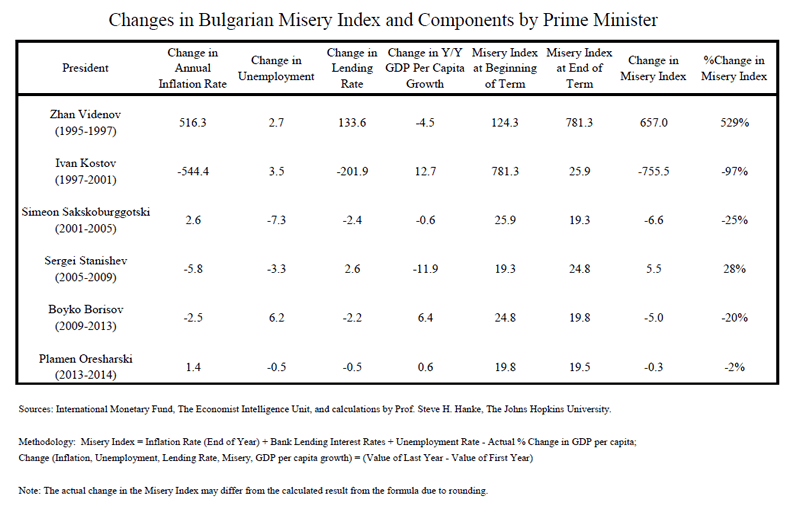Bulgaria’s October 5th Elections: A Flashback at the Economic Records
ElectionOracle / Eastern Europe Oct 04, 2014 - 01:44 PM GMTBy: Steve_H_Hanke
Bulgarians will go to the polls on October 5th to elect new members of its parliament and thus a new government. Before casting their votes, voters should reflect on the economic records of Bulgaria’s governments since 1995.
Every country aims to lower inflation, unemployment, and lending rates, while increasing gross domestic product (GDP) per capita. Through a simple sum of the former three rates, minus year-on-year per capita GDP growth, I constructed a misery index for each of Bulgaria’s six governments since 1995 (see the accompanying table).

The first government documented in the table is that of Zhan Videnov’s socialist government. It was a disaster. Hyperinflation occurred on Videnov’s watch, with the monthly inflation rate reaching 242% in February 1997. The misery index soared by 529% during Videnov’s short-lived reign.
Bulgaria clearly lacked an “economic constitution”—one that would provide fiscal discipline and monetary stability. So in the midst of the turmoil of the 1996–97 hyperinflation episode, Bulgaria took an important first step toward what would become an economic constitution.
As an adviser to President Stoyanov, I played a role in ending Bulgaria’s hyperinflation nightmare. Six short months after I presented my blueprint for a Bulgarian currency board to the president, the currency board was born (July 1997). With the currency board in place, Bulgaria’s misery index fell like a stone, falling by 97% during the conservative Kostov government’s tenure. Fiscal discipline and monetary stability were finally established.
Since the Kostov years, Bulgaria has had four governments and the misery index has fluctuated around a reading of 20. The currency board has clearly given Bulgaria fiscal discipline and monetary stability. The misery index readings in the table attest to that fact. The other thing that the misery index readings make clear is that the socialist-led governments in Bulgaria have delivered misery (Videnov 1995–97, Stanishev 2005–09, and Oresharski 2013–14).
By Steve H. Hanke
www.cato.org/people/hanke.html
Twitter: @Steve_Hanke
Steve H. Hanke is a Professor of Applied Economics and Co-Director of the Institute for Applied Economics, Global Health, and the Study of Business Enterprise at The Johns Hopkins University in Baltimore. Prof. Hanke is also a Senior Fellow at the Cato Institute in Washington, D.C.; a Distinguished Professor at the Universitas Pelita Harapan in Jakarta, Indonesia; a Senior Advisor at the Renmin University of China’s International Monetary Research Institute in Beijing; a Special Counselor to the Center for Financial Stability in New York; a member of the National Bank of Kuwait’s International Advisory Board (chaired by Sir John Major); a member of the Financial Advisory Council of the United Arab Emirates; and a contributing editor at Globe Asia Magazine.
Copyright © 2014 Steve H. Hanke - All Rights Reserved
Disclaimer: The above is a matter of opinion provided for general information purposes only and is not intended as investment advice. Information and analysis above are derived from sources and utilising methods believed to be reliable, but we cannot accept responsibility for any losses you may incur as a result of this analysis. Individuals should consult with their personal financial advisors.
Steve H. Hanke Archive |
© 2005-2022 http://www.MarketOracle.co.uk - The Market Oracle is a FREE Daily Financial Markets Analysis & Forecasting online publication.



